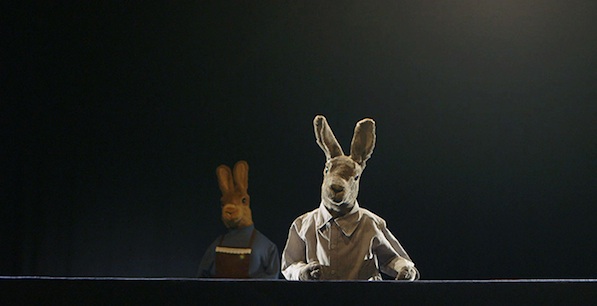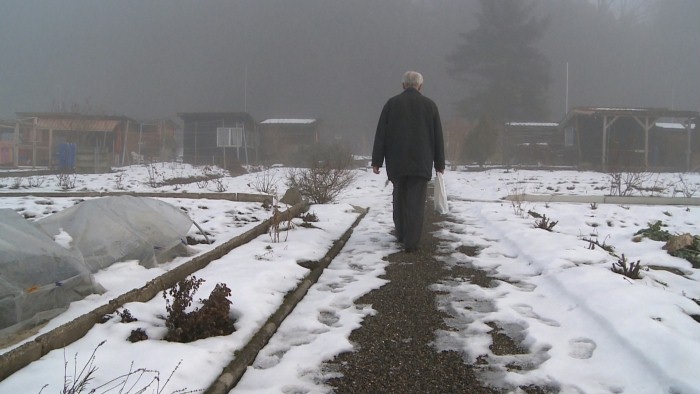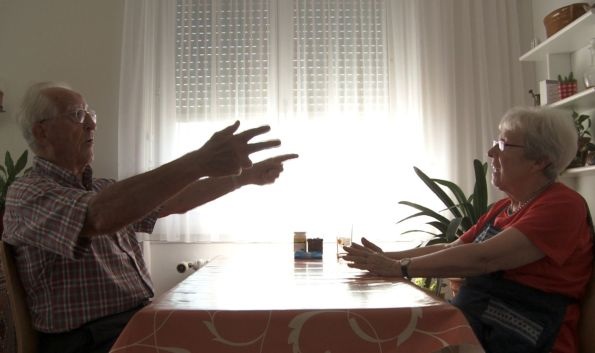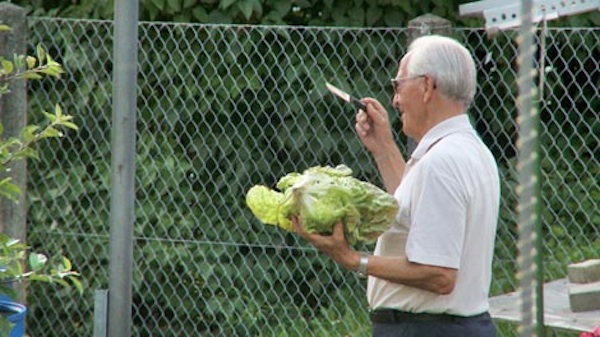Last Friday Peter Liechti passed away suddenly. Born in 1951 in St. Gallen, Switzerland, Liechti was one of Switzerland’s most accomplished and outstanding directors. He studied the history of art, then for years worked as screenwriter, cameraman and director. His films swept awards at numerous festivals, including Locarno, Torino, Leipzig, Saarbrücken or Solothurn. In January, 2009, the International Film Festival Rotterdam organized a retrospective of his films. His previous production, The Sound of Insects: Record of a Mummy received the Prix Arte of the European Film Academy for the best documentary of 2009.
Liechti never followed rigid genre distinctions and resisted classification, drawing from many different, but equally inspirational sources. For Liechti, documentary or fact has always been just a starting point for fascinating narratives. Widely acclaimed Father’s Garden (Vaters Garten)—The Love of My Parents, recently awarded best Swiss documentary of the 2013, and his last finished film, is a deeply moving encounter with his elderly parents, a clash with his own painful memories, revision of long-gone values and an attempt to learn how to find a connection long gone and perhaps never established. It looks at abstract parental figures in order to find bare humanity in them for the first time. Using puppets in the most emotionally naked scenes, Liechti has created a film that yet again escapes any classic definitions. But without doubt it tackles the issues of love, faith and mortality with the openness, maturity and emotional wisdom characteristic of both true artists—and extraordinary people. We talked about the film last year, after it premiered at 63. Berlinale, winning the 2013 Forum Audience Award.
Keyframe: In the very beginning of the film you say that what somehow inspired you to shoot it was accidentally bumping into your father on the street. Was it unusual for you to see him, is this what struck you? What was your story before you started shooting this film?
Peter Liechti: There is no specific story to tell. We didn’t have a very good relationship. We had loose contact for many, many years before that moment. Maybe we’d see each other once a year. But that’s one point. The other thing is it was not familiar to me to meet my father in a public space. I never saw him like that before. Normally you meet your parents by appointment, within your family or in their apartment, but not by coincidence. I wasn’t conscious of that. I was the first time in my life I met my father on the street, like a passer-by. Very strange experience. It took me a while to recognize him.
Keyframe: What was it about you when you were young and still living with your parents that they couldn’t accept? Why, for so many years, there was no possibility of communication?
Liechti: There are so many reasons I can’t name them all. Some are very private. But of course, there were differences. Every family has its rebel, the one that doesn’t fit in, like a cuckoo’s egg. That was how I felt when I was a teenager—not before. But when I grew and started having my own thoughts and opinions, my father couldn’t accept it. He had his fixed ideas about my future, about who his son was—but that wasn’t me. I guess it happens a lot? But then [usually] you come to a discussion. And it was something impossible within our family for many, many years. It started again when I, myself, started to be kind of calmer. That’s why I had to get so much older to be able to make this film. It wouldn’t be possible to do that five years ago. We were not ready for it. It seems very strange when a sixty year old person makes a portrait of his parents. But they still are my mother and father, still alive, happily, luckily….So it was a chance to go back together, see the points, discuss them once again. It was good for both sides, I guess.
Keyframe: I am much younger than you, I know. But at a certain point I came to an important realization about my parents: I got to understand they don’t have to be perfect, or perfectly mature all the time. We are all adults now, and finally I see them as people, not only as my parents. I have a feeling you as well got to know your parents as humans, entities, more that paternal and maternal figures, when you were shooting it.
Liechti: I got to know my parents in a way I never knew them before. I started to accept them. I guess I did not realize that there was a time when they started to accept me; I missed that. I needed to make this film to learn to accept them, to see their life the way it is. And to see very positive points in it. Everybody has one thing in common, all the people in this world: we all have parents. And it sticks like a bullet in your head, you cannot cut it out. So when you’re younger, it was my case, somehow, unconsciously, you expect your parents to be better, to know more, you want to admire them. I guess it is a never-ending disappointment. If you start growing up to realize they are not perfect, not better—they are just as imperfect like everybody else–it’s time to accept that and get on an equal level. When I was young, there were many experiments with this anti-authoritarian education, aimed to say that our parents are our friends. It’s not true and it’s not possible. There is a very unique relationship between parents and their kids, a lifelong one. There’s nothing comparable to it. We are not friends. I am the son of my parents, they are the parents of their son. And I am the father of my son. That’s a very specific relationship. If you cannot come clear with it, you suffer your whole life.
Keyframe: In the press kit you mention that your parents have refused to learn the new technologies, anything modern. Was your decision, or first—the suggestion–of making a film about them something difficult to understand or accept for them?
Liechti: I think it was a part of this process of finding peace with one another. I was really surprised how open they were. Not tight, but very open. I started to realize now it’s me who has to be responsible, take care of them, because I am the man with the camera. So we changed positions in a way, because they are not really aware of what’s happening; nobody in their position is. In a way I was very curious [of that], but had to protect them. It was a very new experience for me. I think the trust they had in me—because they are not stupid, they realize in a way that’s a very delicate situation—that was a very good experience. And new, because I think they have never trusted me before.
Keyframe: When you became aware of the need to protect them, was it then, or before, that you came up with the idea of using the puppets? The scenes with the puppets are usually the most delicate, and I was often glad I don’t see the actual faces….
Liechti: This film wouldn’t have been possible without that kind of a trick. Because it’s very dense what they say. Not only old people, but many people in general are not [fluent in] speech, they need a lot of words to tell their story. So I had to compress it. And I wanted them to be authentic. I feel they are much more authentic as those puppet-rabbits, in a way, than if I exposed them to the camera. And the other thing is what you said: it’s protection. Sometimes they felt very uneasy in front of the camera, especially in those interview situations. Before I started shooting I knew I was not going to show interviews with my parents in front of the camera. That’s typical television staging, a very brutal situation, it’s what you’re doing with me right now [note: this interview was also recorded on video.] [Laughs.] I didn’t want to do it to my parents. I wanted to have them exposed to the camera in a very relaxed, everyday way. And the rest would be a reenactment. I used puppets, because they have many meanings; they symbolize childhood. When I was a kid, we’d often go to a puppet theater. Puppets are also nice, cute. [In my film] they say terrible things, but are still cute. For me it would’ve been to much without them. It was the only way not to loose my parents. I call it ‘the family tribunal’—like an arena. So we do the interviews on stage, as rabbits, puppets.
Keyframe: Except for being nice, cute and cuddly, puppets are also something that’s moved by somebody else’s will. Maybe that’s just my perspective, but at times, especially listening to your mother, I had a feeling she was immensely shaped by the circumstances. If she was born at any different time, she’d be a completely different person… Even though she’s so rooted in tradition and religion, there are things she says—about her feelings, desires, mostly unfulfilled—that are very brave….
Liechti: Let me tell you something about the puppets. You know they are not themselves, somebody is moving them. They are manipulated. Do you think when you see actors in a movie [they are not manipulated]? Sometimes [they are] as well, if they’re bad actors, you know. If they’re good I accept the game, I accept the director telling me a true story through the actors. So the puppeteers are using their puppets to tell their story. After a couple of minutes you forget about this filter, it becomes real. It’s very fascinating, because puppets are somehow real in a theater, you know. For example kids who are used to animated films, very brutal, with shooting and killing and everything, they fall asleep in front of the TV. But if they are in a puppet theater and the devil is appearing [note: here, he makes a screaming sound and a scared face] they are afraid. Because it’s a very strange type of reality—I call it meta-reality. It was always very fascinating to me and I wanted to transport it to cinema.
Keyframe: After watching the film it becomes quite clear that your view on life is quite different from your mother’s or sister’s. There is this one scene where they are praying together and then discussing the scripture. The angle changes weirdly…and I don’t want to be mean, but their beliefs are obviously foreign to you. They believe in heaven and hell and describe them vividly. Did you ever feel like you might make them look… funny? That your lens might in a sense mock them?
Liechti: Yes, of course I was afraid of that. It is a very delicate scene, because for them it’s very intimate. Normally in this film I’d use puppets for scenes like that but then the danger is it might look cartoonish. And this scene was so real, very real… They are simultaneously naive, lost within their very unbelievable fantasies and, at the same time, not aware of how brutal they are to the others. To me, in this case. Because they say: ‘We go to heaven when we die, but not you.’ They are not conscious about their cruelty. But that’s why it is impossible to come really close. There’s a real wall between nonbelievers and very religious people who are very dogmatic, almost fanatic in their attitude… I thought it was right to show it for once in this film, not to hide it behind puppets. And I hope I can get [the audience] back to feeling sympathetic towards them [afterward]. For me it is the hardest moment in the film.
Keyframe: It is. It exposes the impossibility of finding a common ground without a dramatic shift. Either you turn Christian or they lose their faith. Both impossible….
Liechti: Bad luck if you don’t find God, bad luck….
Keyframe: Your father represents this type of masculinity that still resonates with the men of today. Like him they want to be powerful, heard, appreciated, be the decision-makers… But on the other hand such men are gone. Looking at your father what do you think about the changing vision of masculinity?
Liechti: There is so much to say about this… I guess my father’s story is also a sad one. Because he did not develop in a way. He stood still. He was, not in a good sense, conservative. Like when he says that he still wears the same hairstyle as he did when he was twenty years old, and he says it with pride. It’s not a very alive attitude. And of course I suffered under this attitude as a young boy. Because as a young person you want to develop and then your father says: ‘No. It has always been like that. It has to stay this way.’ And then, of course, I started to be a rebel. I was against everything he told me. When he said ‘yes’, I’d say ‘no.’ Always opposite. Of course. Then I started to get older—I am not saying wiser, just older, had more experience—and today’s society has very few values left, everybody’s like: ‘Let them do whatever they want.’ I started to think back. I started to miss the real values. And I came back to my parents, to listen again. I am not saying they are right. But we also lose some values, this generation. In a way it’s good that the values change, but we have to be very careful not to forget everything they taught us. I had to grow older to realize that. Before everything my parents said was a taboo. It’s not good for life. They have some very solid base in their values. It’s a pity it will disappear when they die.
Keyframe: The best example of how times have changed is that today if people like you parents have met—IF they’d meet at all!—they’d never get married. They keep on talking about how different they are throughout the whole film. But I agree with you on the values. What really struck me is how the system your parents were brought up with limited them. The film is called Father’s Garden—and the garden you father has it’s his micro-space where he can show not only his regularity but also tenderness. He’s not that tender towards anyone or anything else. It made me incredibly sad.
Liechti: Yes. Me as well. I don’t say it is a very happy movie… Because it was not a happy experience. But also it’s not just sad. Because my parents came to a point when they understood things. They are not brutal people, never. Not aggressive. My father has never been a vulgar person, never hated his life. He was smart in a way, but very stubborn. And insecure about himself. He starts to shout whenever he’s not sure of something. ‘Shut up, now!’—because he doesn’t know. That’s his attitude, still. He would not confess to a wrongdoing, say sorry, but start screaming. He doesn’t not know that a man can be soft, sad, show his sadness… He learned that a man never shows his feelings. It’s sad fact about this generation, the roles [it imposes]. Both of my parents suffered a lot under those fixed roles in the society. A woman has to be that, a man has to be that… And none of them fits into those patterns, not at all. But they’ve spent a lifelong trying to fit in. That’s a tragedy.
Keyframe: But in a sense it’s also worthy of recognition. They made a commitment and stuck to it. This is something we, the society deprived of values you talked about, don’t really do anymore…. Everything is temporary.
Liechti: Yes, that’s very true.
Keyframe: Last question. In the press kit you describe your parents as very Swiss. How do you think audiences from outside of your country will respond to this narration? Is this film Swiss as well?
Liechti: One of many questions, in a way… I believe that if you show something very personal… I am Swiss, but this is very personal, I show you my village, my family, a very limited reality. Such things have the most universal power because everybody knows these situations by heart. So in a way it is very Swiss—this order, cleanliness, my father’s fondness of it, folding the underwear. [Laughs.] But such ‘maniacs’ are everywhere. For example I think Poland [where the author of this interview comes from.] is also originally a very conservative society, with a strong Catholic tradition. My mother is not Catholic, but Protestant; that’s even worse. It’s like those priests from American TV. That’s really heavy stuff. I’m not saying Catholics are not serious, but they are sometimes funny. There’s no fun in Protestantism. So I’m sure Polish people, but also other nations, will understand what I mean. I don’t know if they’ll find it interesting but they will understand very well.







